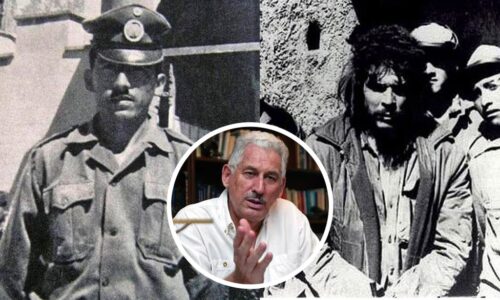

ANGELA FROM HER OWN DARKNESS: A TALE BY RENÉ BASCOPÉ ASPIAZU
I cannot recall when I began to feel fear for that room in the second courtyard. However, I think I remember an afternoon when we were playing soccer, when the rag ball hit the closed door with force, making its worn-out structure creak. Suddenly it seemed to me that the noise that had entered the room was slowly transforming itself into a resounding echo that kicked up dust, stirred cobwebs, and shifted things. Then I felt how it quieted and took hold of the air, filling it and absorbing everything, in such a way that if the door were suddenly opened, the overgrown noise would have overflown into the patio, dragging and drowning us.
Never before, until the day the house keeper’s son swallowed poison to kill himself for Yolanda, did I realize that the room was occupied by two old women and a tall, pale girl named Angela. Just that day, as my mother and I watched Roso rolled on the cobblestones, vomiting and screaming in pain, I was surprised to see the door open imperceptibly. The blood froze in my veins, because I had the intimate assurance that this room was uninhabited. Luckily Roso was slow to die until night fell, and I took the opportunity to look in more detail through the small opening left as if on purpose. Angela was motionless in a chair and the two old women took turns watching the spectacle of the poisoned young man who did not allow himself to be touched by anyone, while his father cried hysterically in a corner. Just as I had unconsciously assumed, the objects I saw were older than my imagination could tolerate. What depressed me the most was the large number of pictures of saints with faces that were satisfied with so much suffering that were hung on the back wall, and a small, crucified Christ, bleeding everywhere and with so long a hair that it scared me and made me nauseous. We stayed that way until Roso died and we still remained that way until the police arrived to take the body away. By then the door had closed completely, pretending that no one existed behind it.
(During All Saints’ Day, my mother and my grandmother spread a black cloth on the small table in the darkest corner of my room. On top of it, they slowly place the portrait of my grandfather who had died fifteen or twenty years ago, while they dust it off with a cloth; then they light a candle and fix it with the melted wax that drips from it in a porcelain saucer. The portrait is dazzled. My grandmother brings a glass full of crystal clear water and places it on the cloth; then we all pray while I chew a piece of bread. At night I cannot sleep with the candle lit and with the fear of seeing the sad look of my grandfather enclosed in his photograph, while his soul drinks the water from the glass crying and in great gulps. Flame sizzles and my mother doesn’t realize my fear, so she sleeps instead of hugging me.)
My childish cunningness, with truculence, made me devise a thousand ways to be able to carefully observe the interior of that room. Sometimes, however, the door would remain closed for several days, although I knew from the smell that came from the cracks that Angela and the old women were inside.
In time, the features of the three women became familiar to me; I looked at them without their noticing, while playing anything. When they went out, she always walked between the two old women, and it seemed that she was suffering so deeply, that I began to love her with all the strength that fear allowed me. I was sure that the hair in a bun, the black veil, the hump and the coat down to the shins, were imposed by the women to make her look like them. But Angela had an original pallor that totally differentiated her from them.
When my mother realized that I liked to stay longer than necessary in the yard, she inexplicably began to demand that I leave the games before dark. But it was precisely at the time of the beginning of the night when Angela left guarded by the old women. So the first few times, I refused to obey with gambling pretexts, but later, in the winter, when the night came earlier, my excuses ended. I hence decided to tell her that I wanted to go to the bathroom. That was how I deceived mother, by making her see me enter, and then sneak out and hide in the darkness of the alley that connected my patio with the second, until Angela went out to the street.
I cannot remember when I found out that Angela was not her name; that it was Elvira, that the old women were her mother and aunt, and that every night, inevitably, they went to the 7 o’clock San Francisco mass. Since then I dared to approach the door, shamelessly, as they were leaving, to see each night, from different angles, the room; I would mentally put together the interior images, until I knew well the location of the table, the two beds, the pictures, the wooden trunks, the old chairs, and all the other things.
(In the mornings of All Saints’ day, my mother is the first to wake up, she gets up and looks indifferently at the almost empty glass, picks up the remains of the burning candle and throws them into the garbage can. I still feel my grandfather’s soul crying deeply when we go out. In the courtyard, the dog looks at us with the eyes full of rheum because it has seen the spirits roaming the house all night. In the cemetery I still hear the distant crying, interspersed with the tolling of the bells that bring the smell of corpses and flowers. When we are done praying rain begins to fall on the graves and the morning seems late.)
A long time ago, due to bad luck, while I was hiding waiting for Angela to leave, Mrs. Juana and Carlos’s father appeared at the other end of the alley. Without seeing me they began to hug and kiss and touch everywhere, hastily. But when Carlos’s father aw me, I only managed to run towards Angela’s door, while he chased me tying up his pants. Just as he reached me, the three women were leaving the room. That day I saw for the first time that Angela was looking at me, that’s why I didn’t feel the blows that Carlos’s father gave me as he dragged me to my room.
From that moment on, my mother would not let me go out to the patio, because I was corrupted. But the only good thing that happened was that she didn’t find out that I loved Angela or that I was afraid of the room on the second patio.
I thought my confinement would not last long, but my mother did not forget that night in the alley, and she even thought about us going to live somewhere else, because she was way too ashamed of Carlos’s father. But my grandmother, who advocated for me a bit, told her not to do crazy things, that nowhere would we find a room for rent so cheap, and that she should finally stop bothering, that it was not a big deal. It seems this made my mother settle.
For Christmas I found, under the bed, a wooden truck, painted purple and blue. I believed that by giving me that gift, my mother forgave me, because she also was so happy that she got distracted and I went out to the patio dragging my toy towards the alley. When my mother found out, she called out to me, angry, but I could see that Angela’s door was locked with a large, half-bolted padlock.
Since the morning in which we heard an infernal shouting in the courtyard, because Carlos’s father had split his wife’s head with an ax, while Mrs. Juana cried out, taking her hands to the deep wound the dead woman had inflicted on her face, my mother breathed calmly and let me go out to play for a few moments. However, the longtime of confinement prevented me from having fun as before, and, what was even worse, I found out that my friend Carlos had been in the hospice since his mother died and his father had been imprisoned. In the moments when I could go to the second patio, I always found the door closed, as if no one had ever lived in that room. There was a moment when I wanted to beg my mother to let me go out, even for five minutes, at nightfall, on condition that I did not go out all day, but I could never do so. (During All Saints’ day [Todos Santos festivity], I run to the room on the second patio and when the door opens, I see in the background, on top of a black table, a candle burning in front of Angela’s portrait. At night my mother makes me pray and gives me cookies. I can’t sleep afterwards because, while my grandfather’s soul drinks the water from the glass, Angela slowly places herself on a spot lying down, from which she stares at me and whispers to me with her soft voice. I see her paler and more hunched over than before. At dawn, she begins to cry silently and leaves. My mother wakes up, prepares breakfast and changes the candle that is about to go out. My grandmother gets up and scrapes with her nails the fly excrement that has accumulated in the portrait. As we left for the cemetery we found the dog asleep, with a great deal of rheum in its eyes, my mother comments that if you want to see the spirits of the dead, you just need to smear your eyes with the rheum of a dog’s eyes. In the cemetery, we pray a great deal and my mother greets the two old women in Angela’s room as it starts to rain, I look at them with hatred. Then we put the white illusions in an antique vase. My grandmother says that her husband’s grave deteriorates more every year. Upon returning to the house, it rains harder and the rain does not let the tremulous sound of the bell tower be heard. I mentally pray for old women to never die. The moment my mother opens the door to our room, I take the eye-rheum from the dog that is still sleeping.)




